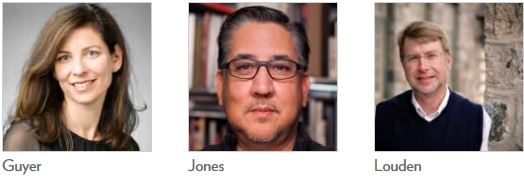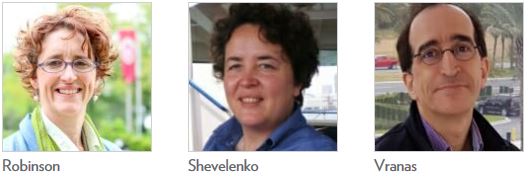3.15.18 | UW–Madison News | Natasha Kassulke | Original Publication
Thirty-three faculty representing all four divisions at the University of Wisconsin–Madison have been honored with 2018 faculty fellowships.
The awards are made possible by research efforts of UW–Madison faculty and staff. Technology arising from these research efforts is licensed by the Wisconsin Alumni Research Foundation (WARF). Income from successful licenses is returned to the Office of the Vice Chancellor for Research and Graduate Education to fund research activities throughout the divisions on campus, including these awards.
Fourteen faculty have received H.I. Romnes Faculty Fellowships recognizing faculty up to six years past their first promotion to a tenured position. The award is named in recognition of the late Wisconsin Alumni Research Foundation Trustee President H. I. Romnes and comes with $60,000 that may be spent over five years.
Eleven faculty have been honored with Kellett Mid-Career Awards to support faculty who are seven to 20 years past their first promotion to a tenured position. The award was created to provide needed support and encouragement to faculty at a critical stage of their careers and comes with $75,000 that may be spent over five years. The award is named for William R. Kellett, a former president of the WARF board of trustees and retired president of Kimberly-Clark Corp.
Eight faculty are appointed to WARF Named Professorships. The awards, which come with $100,000, honor faculty who have made major contributions to the advancement of knowledge, primarily through their research endeavors, but also as a result of their teaching and service activities. Award recipients chose the names associated with their professorships.
Here are brief profiles of the 2018 award recipients by division. For more complete research profiles visit research.wisc.edu or the faculty websites:
Arts and Humanities

Michael Bernard-Donals, Chaim Perelman Professor of Rhetoric and Culture, focuses his research on the relation of memory and ethics. (WARF Named)
Harry Brighouse, Mildred Fish-Harnack Professor of Philosophy of Education, studies political philosophy, philosophy of education, the just distribution of educational opportunities and what kinds of educational goods children should develop. (WARF Named)
Cindy I-Fen Cheng, associate professor of history and director of the Asian American Studies Program, studies the multiple and conflicting ways in which race, gender, class, sexuality and nationality structure society, determining who gets to be included and excluded. (Romnes)

Sara Guyer, professor of English and director of the Center for the Humanities, is a scholar of British and European Romanticism and its legacies. (Kellett)
Tom Jones, professor of photography, studies American Indian identity, experience and perception. (Romnes)
Mark L. Louden, Alfred L. Shoemaker, J. William Frey, and Don Yoder Professor of Germanic Linguistics, studies the Pennsylvania Dutch language and the Amish and Mennonite groups that speak it. (WARF Named)

Sue Robinson, professor of journalism and Helen Franklin Firstbrook Professor of Journalism research chair, studies how journalists and news organizations adopt new information communication technologies to report on public affairs in new forms and formats, as well as how audiences and individuals can use the technologies for civic engagement. (Romnes)
Irina Shevelenko, professor of Slavic languages and literature, studies Russian modernist literature and art, Russian émigré literature, late Soviet culture, Russian poetry, Russian intellectual history and nationalism. (Romnes)
Peter B. M. Vranas, professor of philosophy, studies the logic of obligations, moral dilemmas and time travel. (Kellett)
Biological Sciences

Richard Amasino, Carlos O. Miller Professor of Biochemistry, studies plant development and biochemistry. (WARF Named)
Cécile Ané, professor of botany and statistics develops statistical methods and software for the study of molecular evolution and of trait evolution. (Romnes)
Jean-Michel Ané, professor of bacteriology and agronomy, studies symbiotic associations between plants and microbes. (Kellett)
Erik Dent, associate professor of neuroscience, studies the fundamental mechanisms by which the cytoskeleton functions in developing and mature neurons. (Romnes)

Natalia de Leon, professor in the department of agronomy and trainer in the Plant Breeding and Plant Genetics Program, studies genomic, transcriptomic and phenomic information to accelerate translational research for enhanced sustainable crop productivity. (Romnes)
Ruth Litovsky, professor of communication sciences and disorders, studies how humans function and learn in complex auditory environments and directs the Binaural Hearing and Speech Lab at the Waisman Center. (Kellett)
Gail Robertson, professor of neuroscience, studies how excitable cells of the heart and brain produce coordinated electrical activity. (Kellett)
Edgar Spalding, professor of botany, studies physiological processes responsible for seedling growth and development. (Kellett)
Physical Sciences

Aditya Akella, professor of computer sciences., builds software systems that improve the performance, security and correctness of modern cloud computing infrastructure. He directs the Wisconsin Internet and Systems Research (WISR) Lab, and co-leads CloudLab, a large open infrastructure for cloud computing research. (Romnes)
Tristan L’Ecuyer, associate professor of atmospheric and oceanic sciences, uses state-of-the-art satellite observations to address current grand challenges in climate science. (Romnes)
Cary Forest, Stewart C. Prager Professor of Experimental Physics, studies experimental plasma physics at the border between nuclear fusion research and plasma astrophysics. (WARF Named)
Ying Ge, associate professor of cell and regenerative biology and chemistry, studies molecular and cellular mechanisms underlying cardiac diseases and regeneration via systems biology approaches featuring high-resolution mass spectrometry-based top-down proteomics. (Romnes)

Shaoqin Sarah Gong, professor of biomedical engineering and the Wisconsin Institute for Discovery, engineers multifunctional nanomaterials for various applications. (Kellett)
Ive Hermans, professor of chemistry and chemical and biological engineering, studies sustainable ways to produce chemicals and fuels by using catalysts. (Romnes)
Robert Mathieu, Albert E. Whitford Professor, studies kinematics and dynamics of star clusters and star-forming regions, stellar binary populations, blue stragglers and other objects with alternative stellar evolution pathways, formation of binary stars and stellar angular momentum evolution. (WARF Named)
Katherine (Trina) McMahon, professor of bacteriology and professor of civil and environmental engineering, studies the water microbiome and the ecology and evolution of freshwater lake bacteria and bacteria responsible for cleaning wastewater. (Kellett)
Social Sciences

Maria Cancian, professor of public affairs and social work, studies the interactions of the incarceration, child welfare and child support systems, as well as the implications of multiple partner fertility for family organization and policy. (Kellett)
Michael Collins, associate professor of public affairs and human ecology, director of UW–Madison’s Center for Financial Security, studies consumer decision-making in the financial marketplace, including the role of public policy in influencing credit, savings and investment choices. (Romnes)
Mustafa Emirbayer, professor of sociology, relational sociology, studies the American pragmatist tradition, cultural analysis and the sociology of Pierre Bourdieu. (Kellett)
Jenny Higgins, associate professor of both Gender and Women’s Studies and Obstetrics and Gynecology, dedicates her research efforts to improving reproductive and sexual health. (Romnes)

Jonathan Mark Kenoyer, George F. Dales Jr. and Barbara A. Dales Professor of Anthropology, has devoted his career to studying cultural traditions of South Asia, spanning the Paleolithic to the present, with a special focus on technology and trade of the Indus Civilization of Pakistan and western India. (WARF Named)
Lones Smith, David Blackwell Professor of Economics, studies game theory and information economics. (WARF Named)
Seth Pollak, professor of psychology and director of the Child Emotion Research Laboratory at the Waisman Center, studies the influences of environmental risk factors on children’s brain and behavioral development, child emotional development and the effects of chronic stress on children’s learning and health. (Kellett)
Mitra Sharafi, associate professor of law, history department affiliate and part of UW’s Legal Studies program, studies the legal history of South Asia. (Romnes)